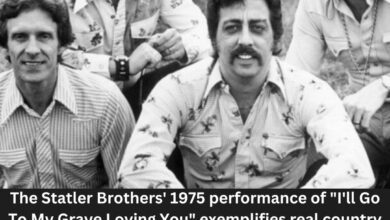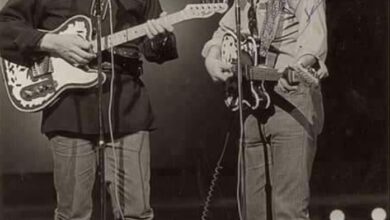Dynamic Performance: Dwight Yoakam’s “I Sang Dixie”
Dwight Yoakam’s live rendition of “I Sang Dixie” stands as a poignant chapter in his multi-faceted career, intertwining deeply with the larger narrative of country music and American cultural memory. The song’s genesis dates back to his critically acclaimed 1988 album “Buenas Noches from a Lonely Room,” wherein it serves both as a tribute to Vietnam veterans and a harrowing exploration of the emotional toll of warfare. At a time when returning veterans faced significant societal hurdles—often navigating the choppy waters of indifference and misunderstanding—Yoakam’s heartfelt interpretation provided them with a voice, fostering a sense of recognition and validation.
The narrative at the heart of “I Sang Dixie” unfolds through the eyes of a character who encounters a fading Southern man, lost in the bustling streets of Los Angeles. This meeting is more than a mere chance encounter; it is a catalyst for reflection. As the dying man meanders through treasured memories of his Southern homeland, the juxtaposition of nostalgia and loss emerges starkly. Yoakam’s storytelling invites listeners into a complex emotional landscape—a deep embodiment of the sacrifice and struggles faced by veterans returning home, where cherished memories can coexist with disillusionment and regret. His artistry shines through in the way that he captures these dichotomies, effectively translating a personal journey into a universal melody.
Born in Pikeville, Kentucky, Dwight Yoakam grew up heavily influenced by traditional country sounds, but his artistic evolution took a distinctive turn upon his relocation to Los Angeles in the early 1980s. This transition exposed him to a dynamic blend of genres, leading to a sound that elegantly fused honky-tonk with elements of rock and punk. “I Sang Dixie” exemplifies this innovative spirit; the song’s arrangement amplifies the raw emotion of the lyrics, ensuring that its thematic depth resonates profoundly with audiences. This artistic hybridization not only redefined country music for a new era but also cemented Yoakam’s position as one of the genre’s most influential figures.
His lyrical oeuvre often delves into heartache, societal issues, and the human condition, a testament to his role as a storyteller who is unafraid to tackle themes of complexity and conflict. Yoakam’s willingness to engage with the narratives of veterans, particularly through songs like “I Sang Dixie,” underscores his commitment to using his platform for meaningful discourse. By articulating the pain, resilience, and poignant reflections of his characters, he creates a bridge of understanding between the artist and his audience—a signature that has allowed his music to endure over time.
In addition to his musical prowess, Yoakam has also made a significant mark in the film industry. His performances, notably in the critically acclaimed film “Sling Blade,” showcase his range as an artist and enrich his music career by adding another layer of narrative depth. This crossover appeal emphasizes the interconnectedness of storytelling, whether through song or screen. The emotive weight he carries in his performances, regardless of the medium, captivates audiences and ensures his narratives leave a lasting impression.
Live performances of “I Sang Dixie” garner special attention, often eliciting strong emotional reactions from fans who connect deeply with the song. As Yoakam pours his passion into each rendition, the atmosphere transforms; the audience engages collectively in a tribute to the sacrifices made by veterans, fostering a sense of solidarity and shared experience. Concerts become a space for communal reflection, and in those moments, the power of music to unite and heal becomes evident.
The legacy of “I Sang Dixie” stretches beyond its immediate impact, as it has sparked vital conversations about the recognition of veterans’ experiences. In contemporary discourse, where the ramifications of war remain a complex and multifaceted issue, the song serves as a reminder of our shared humanity and the need for empathy toward those who have borne the brunt of conflict. Years after its release, the song continues to resonate, ensuring its place in both the musical lexicon and the collective memory of American society.
Through “I Sang Dixie,” Dwight Yoakam creates a rich narrative that echoes themes of nostalgia, loss, and reflection, ultimately celebrating the sacrifices and stories of Vietnam veterans. The song stands not only as an artistic achievement but as a heartfelt homage to a generation shaped by the complexities of war. By translating the experiences of these individuals into his music, Yoakam reinforces his role as a vital voice in country music, dedicated to weaving intricate narratives that reflect the broader tapestry of American life.
In conclusion, the profound nature of Dwight Yoakam’s interpretation of “I Sang Dixie” transcends the realm of simple entertainment, elevating it to a form of social commentary that honors those who have served. Whether through the depths of his lyrics, the power of his performances, or the significance of his broader contribution to music and film, Yoakam consistently demonstrates an unwavering commitment to storytelling, ensuring that the stories of veterans and their trials are neither forgotten nor overlooked. His work remains a testament to the enduring power of song as a means of remembrance and a tool for fostering understanding across diverse narratives.





